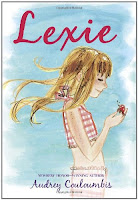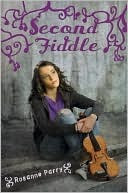
Hurwirtz, Michele Weber.
Calli Be Gold.
Nominated for the Cybils by
Jennifer Wharton
Calli Gold has a family of busy overachievers. Her sister ice skates competitively, and her brother plays basketball. Her mother is the Chief Family Organizer, operating with a complicated system of sticky notes and an enormous tote bag. Calli has tried lessons of various sorts, but would rather just "sit quietly and smell the flowers", which infuriates her parents, who rail that they did not have the many opportunities Calli has to benefit from activities. When her school starts a Peer Helper Program, Calli discovers that she likes helping Noah, better than taking improv lessons. Can Calli make her parents see that everyone has different dreams and goals?
Strengths: There are so many over programmed children and hovering parents, yet this is the first book I can think of that features them. The family dynamics are interesting and true to life; Calli wants to please her parents but also wants to be true to herself.
Weaknesses: The father is a bit over the top.

Couloumbis, Audrey.
Lexie.
Nominated for the Cybils by Sara Soukup
Lexie's parents are divorced, and for the first time she is spending her week at the shore without her mother. To make matters worse, her father is bringing his girlfriend, Vicky, and her two sons. The cabin isn't clean, she doesn't get her regular room, and nothing seems right. Slowly, however, she starts to toddler Harris, who makes truck noises and is constantly dirty, and older Ben, who includes her in activities even though he is a teenager. When Lexie finds out that her father and Vicky are getting married, she is happy because she likes the boys who will be her brothers, but doesn't want to be disloyal to her mother.
Strengths: Even though Lexie is only ten, her feelings about the divorce and remarriage are treated in a way that will make sense to middle school students. I also appreciated that the group spent just a week at the shore and not the whole summer!
Weaknesses: The cover and illustrations might dissuade older students from picking this up, which would be a shame.

Collard, Sneed.
The Governor's Dog is Missing.Nominated for the Cybils by Sallie Lowenstein.
Slate and Daphne are living in Helena because their fathers are both geologists. When the governor loses his dog, Cat, when out walking, the two decide to help solve the mystery. They visit the capitol building and talk to the governor's staff, and eventually the governor himself. They retrace his steps and look for clues, interviewing people along the way who might have seen the dog. Slate has an enormous crush on Daphne, which confuses and embarasses him, because they've been friends for a long time. Finally, the two put together a number of clues and manage to find the dog in an unlikely place, and get recognized by the governor for their hard work.
Strengths: Very strong sense of place, which is something I like. Well paced mystery, with all of the elements students need for their 8th grade mystery project.
Weaknesses: Even though the two are middle schoolers, some details make this seem like a young book. Slate's descriptions of how he feels about Audrey seem akward, and my students never ask for missing dog mysteries-- they want
murder. (Sigh.)

Davies, Jacqueline.
The Lemonade Crime.
Nominated for the Cybils by
Kara Schaff Dean.After Evan and Jessie worked so hard to earn money in The Lemonade War, they are crushed that over $200 disappeared from the pocket of Evan's shorts. They are sure they know the culprit-- Scott, who has just bought an expensive video game. Inspired by a legal pamphlet her mother has written, Jessie "serves" Scott with a warrant in school, and proceeds to try to take him to trial for his crime. In the end, several mitigating circumstances come to light that affect the way that Evan and Jessie view the crime.
Strengths: There is a lot of good information about the legal process and the characters were well developed and sympathetic.
Weaknesses: There never seems to be any doubt about who took the money, and I found it hard to believe that they could accuse Scott in school for something done during the summer.

Larsen, Andrew.
The Luck of Jude.
Nominated for the Cybils by Monica Kulling.
Jude and his mother live in Toronto with his grandmother. He rarely gets to see his father, who runs an Indian restaraunt and seems to be avoiding him. When his best friend Sanjali is hit by a new kid from England, Terrence, and Jude himself later suffers at the hands of this child, Jude tries to figure out why Terrence is so mean. Jude embarks on a study of the game of conkers after being hit in the head by horse chestnuts (or, as we call them here in Ohio, buckeyes) in hopes that the project he must work on with Terrence will help him be less mean.(For more information about what the game of sonkers is, consult the BBC articcle,
Bonkers for Conkers.)
Strengths: I liked the multicultural aspect of this book, the strong family support, and how Jude was trying to figure out what made Terrence so angry.
Weaknesses: A LOT about conkers.

Selfors, Susanne.
Smells Like Treasure.Nominated for the Cybils by Robert Ranson.
Homer Pudding is back (after
Smells Like Dog) and is finally issued an invitation to join L.O.S.T., the Society of Legends, Objects, Secrets and Treasures in place of his uncle, who passed away. Along with his friend Dog, he travels out to the moors to stay with Zelda, an officer in L.O.S.T., and finds out that since he is being challenged for the position by Lorelei, who caused him problems in the first book. Since she has the uncle's coin, she can issue the challenge, and takes Zelda as her guardian, leaving Homer with the sinveling secretary Hercules to help him with the challenge. A back story about the man who made the treasure map, Rumpold Smeller, is told alongside this one. Adventures ensue, and Homer must do his best to win the challenge so he doesn't have to go back home and be a goat farmer.
Strengths: Fair amount of action and adventure, treasure hunting, and slightly evil adversaries.
Weaknesses: Very quirky.
Whew. I feel better. I was updating Cybils databases in my dreams last night!












 Cheng, Andrea.
Cheng, Andrea.
 Thompson, Kate. Most Wanted.
Thompson, Kate. Most Wanted.






 Jordan Sonnenblick
Jordan Sonnenblick

















 Selfors, Susanne. Smells Like Treasure.
Selfors, Susanne. Smells Like Treasure.
 Johnson, Maureen. The Name of the Star.
Johnson, Maureen. The Name of the Star. 


































